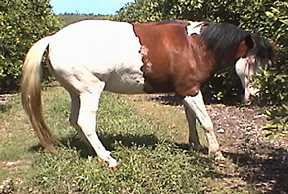
Timely Emergency Intervention Gives the Abaco Wild Horse Mare “Dubhe“ a Chance to Survive. |
||||||||||
 |
||||||||||
|
June 20, 2000
On Wednesday, June 14 the weekly wild horse check found Dubhe limping badly and obviously in pain. She’d become separated from her band when she couldn’t keep up, and another stallion was harassing her. She was badly chewed by the stallion, and tired from trying to move on what appeared to be two injured front legs. Videos were taken and brought to Dr. Robert Allen of Caribbean Veterinary Clinic on Thursday, June 15. Arrangements were made to carry Dr. Allen and two assistants to the farm through the kind help of Cara Butler of “The Firm” law firm. In the meantime, it was found that there is a shortage of a critical tranquilizer in the Bahamas, due to new drug policies set by the U.S. Dr. Maurice Isaacs, of the Department of Agriculture in Nassau, got up from a sick bed to locate one of the few remaing doses and delivered it to a plane to Marsh Harbour where it was picked up by David Knowles, Agriculture Officer in Charge at Marsh Harbour. The medicine replaced a dose donated by Dr. Derrick Bailey of Community Animal Hospital. Milanne (Mimi) Rehor went up to the horses the same day to try to locate Dubhe so that Dr. Allen could get right to work. Rehor searched for three hours, Dr. Allen, Stephanie Allen and Heidi Albury searched for two hours. At dusk the search was abandoned. Dubhe had disappeared. Rehor went up to the horses again on Friday, June 16. Dubhe was located within 15 minutes. She was actually groaning whenever she tried to walk. Yet another stallion was harrassing her. She was dirty, and had many scars and bites. Cell phone contact was made with Dr. Allen, he got in touch with David Knowles and they set out, bringing additional medical supplies. While waiting for their arrival Rehor kept the stallion from further harassing Dubhe and discovered that there was something lodged in her left fore hoof. When Dr. Allen and David Knowles arrived Dubhe was darted with a tranquilizer. She was then calm enough for Dr. Allen to give her painkillers. Though she never went down the way a domestic horse would, she was sleepy enough that Dr. Allen was able to lift the hoof and remove a one inch roofing nail that was completely embedded in her foot. It had pierced the hard underside of the hoof, gone deep into living tissue and was becoming infected. |
||||||||||
 |
||||||||||
| Right: Dr. Robert Allen, left, and David Knowles an Dubhe after the nail was removed.
Below: Duct tape held the poultice in place. It wore off in a few days. |
||||||||||
 |
||||||||||
| After pulling the nail Dr. Allen enlarged the hole so that infection could drain. He rinsed the wound with disinfectant and packed it with Betadyne and Epsom salts. The hoof was then bandaged and covered with duct tape, enough to last for about four days. Dubhe then got some penicillin. Rehor darted more penicillin into Dubhe on Sunday, June 18, and again on Tuesday, June 20. By Sunday she was already back with her regular band. She still had a slight limp but was moving without pain and able to keep up with everyone else. Without treatment the nail would have festered and since the hoof is solid on the outside it would never have drained. Death from infection was just about inevitable. As of this writing, Dubhe appears to be in good health and is walking almost normally again. On behalf of the wild horses of Abaco, Arkwild wishes to extend a big thank you to all the people who took part in the work to save Dubhe: Dr. Allen, Dr. Isaacs, Dr. Bailey, David Knowles, Cara Butler, Heidi Albuyr, Stephanie Allen, and to all the people who continue to give the donations which help offset medical supply costs, transportation costs and vet fees. Many people can be proud of the fact that they helped keep this beautiful animal alive. |
||||||||||
|
|
|

